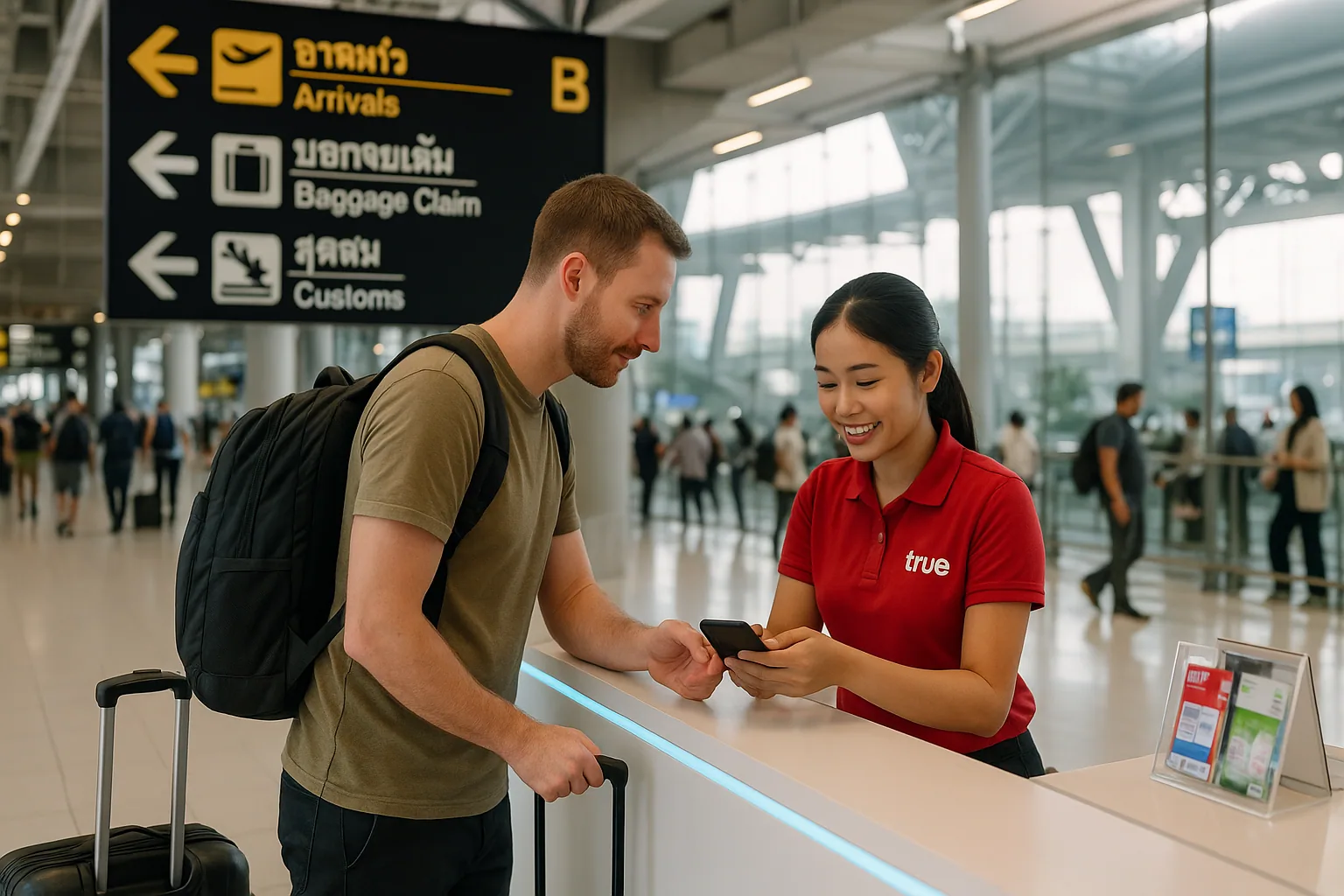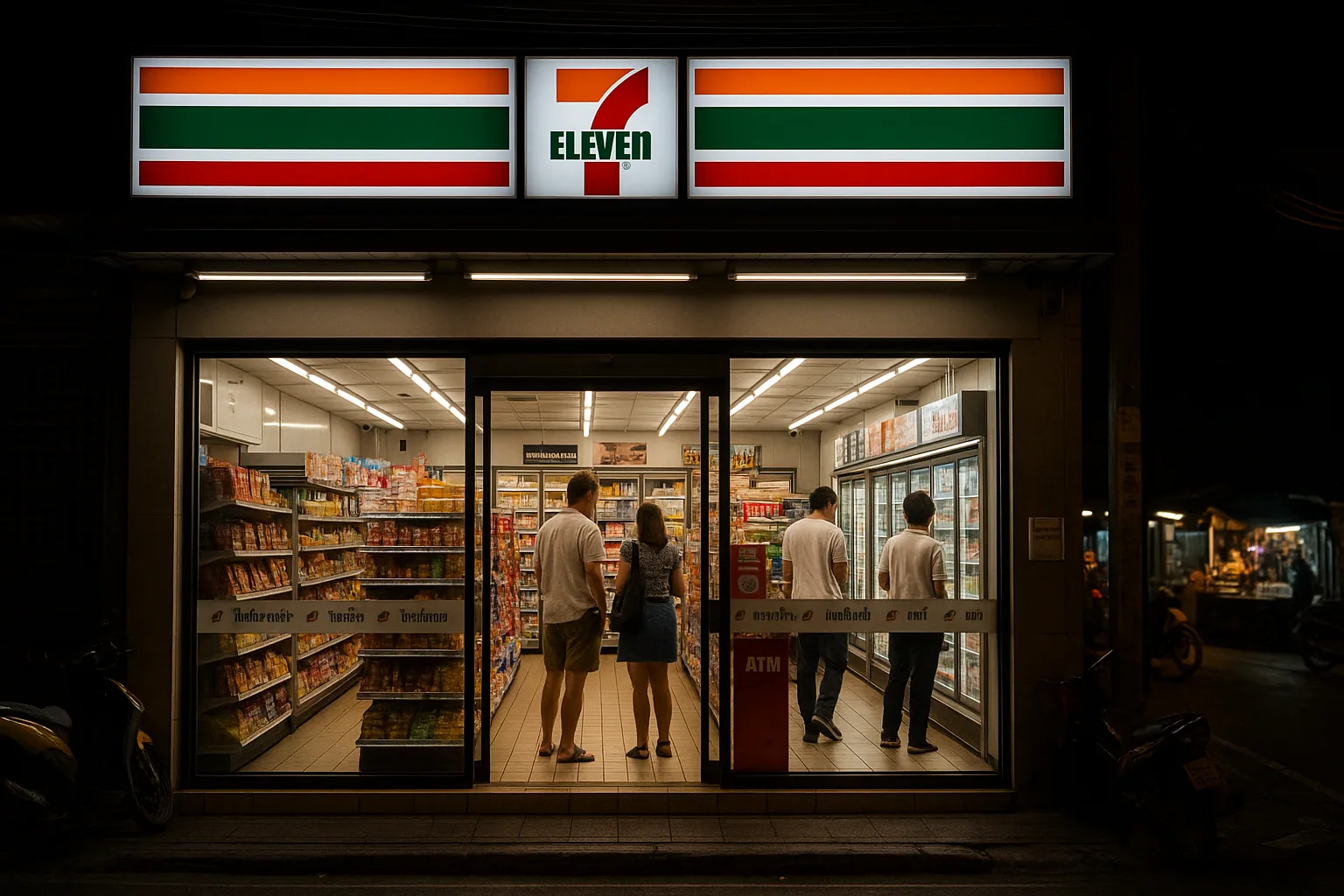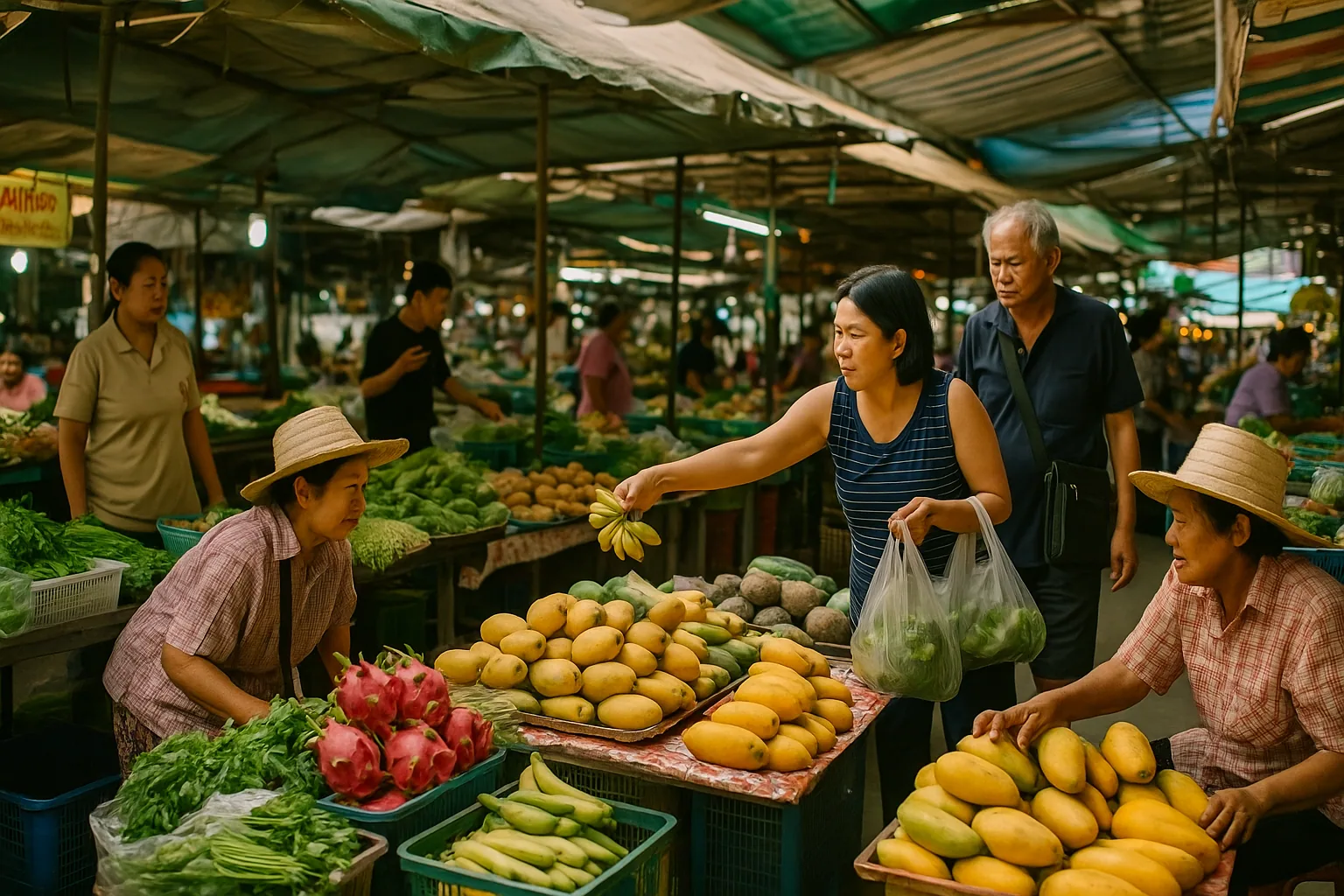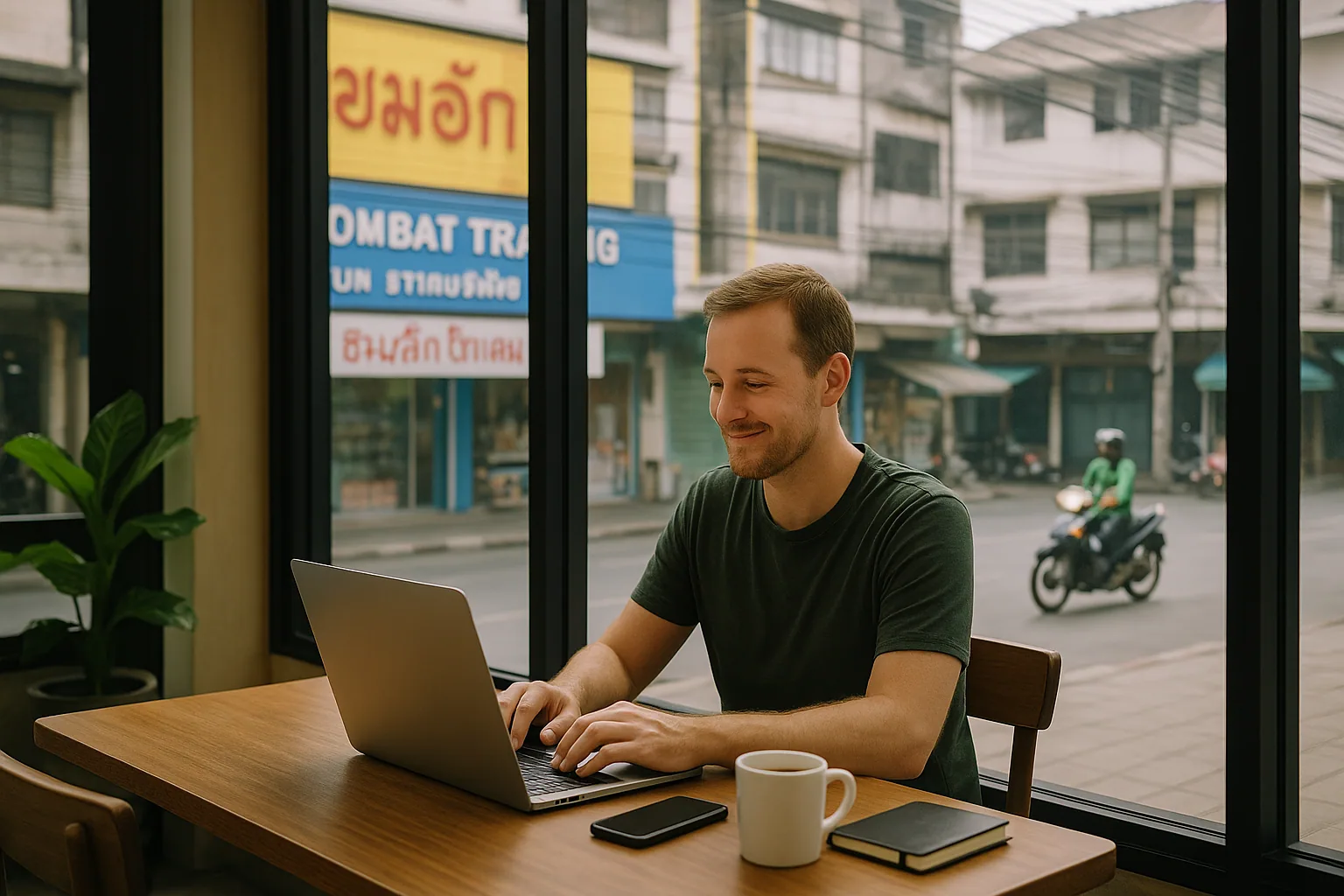🛬First Week in Thailand
Your complete guide to arriving and settling into Thai life
Your complete guide to arriving and settling into Thai life
The blast of heat hits you the moment the airport doors slide open. It's physical, immediate, and unmistakable—the thick, humid air of Thailand wrapping around you like a warm towel. You've been traveling for fifteen, maybe twenty hours. Your clothes feel wrong, your sense of direction is scrambled by jet lag, and you're standing in what's probably the busiest airport you've ever experienced, watching streams of people move with confident purpose while you're still trying to remember if you filled out that arrival card correctly.
This is where your Thailand story actually begins—not with the decision to come, not with the visa paperwork or the farewell dinners back home, but here, in this exact moment of slight overwhelm and possibility. Your first week in Thailand will set the tone for everything that follows. Get the essentials right now, and you'll spend the next weeks exploring markets and making friends. Miss a few key steps, and you'll spend those same weeks scrambling to fix administrative problems while battling unnecessary stress.
I've watched hundreds of newcomers navigate this first week, and the pattern is clear: success isn't about doing everything perfectly—it's about knowing which tasks actually matter and tackling them in the right order. Some things can wait. Others can't. Let's walk through what really needs your attention in these crucial first seven days.
"Your first week in Thailand will set the tone for everything that follows. Get the essentials right now, and you'll spend the next weeks exploring and connecting. Miss key steps, and you'll spend those same weeks fixing administrative headaches."
Immigration at Suvarnabhumi Airport can range from a five-minute breeze to a forty-five-minute ordeal depending on when you arrive. But regardless of wait time, the process itself is straightforward. Hand over your passport and that arrival card you filled out on the plane—the TM6 form with carbon copy that they'll stamp and return to you. That departure portion is crucial. You'll need it when leaving Thailand, and getting a replacement if you lose it means a trip to immigration and paperwork you don't want to deal with. Slide it into your passport immediately and treat them as a single unit.
Check your entry stamp before walking away from the immigration desk. Seriously, look at it right there. Tourist arrivals typically receive 30-60 days depending on nationality and visa exemption agreements. If the stamp says something different than you expected, ask about it now while you're still at the desk, not later when your options are more limited. Immigration officers may not speak perfect English, but they understand "How many days?" and can clarify any confusion immediately.
Once through immigration, you'll face three immediate decisions: phone connectivity, money, and transportation. The airport efficiently separates you from cash on all three, but the convenience premium is actually worth it for your first couple days. You'll find better rates and deals later—right now, you need functioning systems.

The SIM card counters sit right after baggage claim—AIS, DTAC, and True all have booths staffed by people who speak decent English. Tourist packages run 300-500 baht for 15-30 days of unlimited data. Yes, you'll find cheaper options at 7-Eleven later. But these airport staff will install the SIM, configure your phone, test it, and make sure you can actually make calls before you walk away. That alone is worth the markup when you're exhausted and need immediate connectivity to contact your accommodation or call a Grab. Our complete SIM card guide covers long-term options, but for now, just get connected and move forward.
Currency exchange at the airport gets a bad reputation, but the rates are actually acceptable for your initial needs. You don't need to exchange everything here—just enough cash for your first 2-3 days, maybe 10,000-15,000 baht. That covers taxis, first meals, initial supplies, and emergency buffer. Once you're settled in Bangkok, you'll find SuperRich (the orange or green locations) with better rates. But standing at the airport at 11pm after a long flight is not the time to optimize for saving 50 baht on exchange rates.
Airport Rail Link (recommended for solo travelers, light luggage): The cheapest and most reliable option. 45 baht gets you from Suvarnabhumi to Phaya Thai station in central Bangkok in about 30 minutes. Trains run 6am-midnight. From Phaya Thai, you can connect to the BTS Skytrain to reach most areas. Clear signage in English, air-conditioned trains, zero traffic concerns.
Official Airport Taxi (recommended for families, heavy luggage, evening arrivals): Head to the official taxi desk on the ground floor. They'll assign you a metered taxi and give you a ticket. The meter starts at 35 baht, expect 350-500 baht to central Bangkok depending on traffic and destination. You'll pay a 50 baht airport surcharge plus tolls (usually 70-120 baht)—offer to pay tolls in cash when you hit the tollway. Tell the driver "meter" and show your destination in Thai if possible.
Grab (requires working SIM): Once your SIM is active, Grab offers transparent pricing and English interface. Often more expensive than metered taxis but eliminates language barriers and route disputes. Pickup is on level 4 (departures) or designated Grab area depending on terminal.
Whatever transport you choose, save your accommodation address in both English and Thai on your phone before leaving the airport. Screenshot a map showing your exact location. Take a photo of the building name in Thai characters. Most taxi drivers can't read Roman script addresses, and phone data occasionally fails at the worst moments. These redundant backups feel paranoid until the one time you need them, and then they're invaluable. For more detailed guidance on navigating Bangkok, see our public transport guide.
You've made it to your accommodation. Everything in your body is screaming for immediate unconsciousness. But if you arrive in the evening or afternoon Thailand time, sleeping immediately will wreck your adjustment. You need to stay awake until at least 9-10pm local time to have any hope of resetting your internal clock efficiently. Here's how to use those difficult hours productively.
First, if you're planning to stay longer-term or will need any immigration services, handle TM30 confirmation. This is Thailand's notification of residence for foreigners. Your hotel or landlord must file this with immigration within 24 hours of your arrival. Hotels do it automatically—you'll never even know it happened. If you're just visiting for a few weeks and leaving before your entry stamp expires, you can skip worrying about this. But if you're staying in a condo or house rental and planning to extend your visa, do a 90-day report, or interact with immigration for any reason, you need to explicitly ask your landlord for written confirmation that they've filed the TM30.
Why does this matter for longer stays? Because you'll need proof of TM30 filing for any immigration interactions—visa extensions, 90-day reports, changing visa status. Many landlords, especially those who rarely rent to foreigners, are completely unaware of this requirement. Discovering three months later that your TM30 was never filed creates headaches when you try to extend your stay. If you're planning a longer stay, get written confirmation now or, if your landlord seems confused, offer to go with them to the local immigration office to file it together. The TM30 process is straightforward when done correctly from the start.

Next, locate the nearest 7-Eleven. This isn't touristy advice—it's practical infrastructure mapping. 7-Eleven in Thailand is vastly more useful than its Western equivalent. You'll use it for SIM card top-ups, bill payments, ATM access, drinking water, late-night food, and a thousand small emergencies. There's probably one within 200 meters of wherever you're staying. Find it, walk there, buy some water and snacks. Now you know where it is, how long it takes to reach, and whether you need to cross any confusing streets to get there.
While you're out fighting sleep with purposeful exploration, find the nearest ATM. Airport exchange was fine for initial cash, but you'll need more, and withdrawing larger amounts from ATMs reduces the per-transaction fee impact. Thai ATMs charge 220 baht per withdrawal for foreign cards—yes, even your fancy "no foreign transaction fee" card. The fee comes from the Thai bank, not your home bank. This means withdrawing 5,000 baht costs the same fee as withdrawing 30,000 baht. Do the math and withdraw accordingly. Major banks like Bangkok Bank, Kasikorn (K-Bank), and Siam Commercial Bank (SCB) have reliable ATMs. Our ATM guide covers optimization strategies, but the basic rule is simple: fewer, larger withdrawals.
Test your phone thoroughly. Make a local call, try your data connection, send messages. Save your Thai phone number in an obvious place—you'll need it for everything from Grab to bank accounts to utility registrations. Top-up is easy at 7-Eleven if you somehow burn through your initial package.
→ Grab: Transportation, food delivery, package delivery. The most useful app in Thailand.
→ Google Maps: Navigation, business hours, reviews. Download offline maps of your area.
→ Google Translate: Camera translation of Thai text is surprisingly accurate for signs and menus.
→ XE Currency: Quick baht conversions until you internalize the exchange rate.
→ Whatsapp/Line: Most Thais use Line for messaging. WhatsApp for international contacts.
Finally, before allowing yourself to sleep, save emergency contacts. Tourist Police (1155—they speak English), your embassy's emergency number, your accommodation address in Thai, and the nearest international hospital. Program these into your phone with clear labels. Take a screenshot and save it to cloud storage. This feels paranoid until you need them, and then having them instantly accessible is worth every minute spent organizing now.
Wake up on day two with a mission: transform yourself from tourist to temporary resident. This means understanding your immediate neighborhood well enough that you could navigate it half-asleep, which you'll probably need to do at some point given Thailand's occasionally unreliable street lighting and your jet-lagged brain.
Spend day two walking. Not temple visits or tourist attractions—just methodical exploration of everything within ten minutes of your accommodation. Find the BTS or MRT station if one exists nearby. Locate multiple 7-Eleven locations (there are always multiple). Identify the fresh market where locals buy produce—it'll be busier in the morning, but even afternoon exploration gives you the layout. Find pharmacies (Boots and Watsons are everywhere), laundry services (typically 40-50 baht per kilogram, ready in 24 hours), and a few restaurant options beyond tourist-priced hotel restaurants.
Notice the motorcycle taxi stand—those guys in numbered vests who congregate at neighborhood entrances. You might not use them in week one, but knowing where they are matters later. They're the quickest way to navigate sois (small streets) that larger taxis won't enter, and they provide informal neighborhood information if you build rapport over time.
Day three is for stocking your space. Hit a proper supermarket—Tops, Big C, Lotus's (formerly Tesco), MaxValu, or Villa Market if you're near one and craving imported goods. You need water (six-liter bottles cost 15-25 baht and save countless 7-Eleven runs), coffee or tea supplies, breakfast basics, toiletries, and a few practical items you didn't pack. Buy adapter plugs if your accommodation doesn't provide them—Thailand uses Type A, B, and C outlets, though A and B are most common. Grab mosquito repellent and coils; even urban Bangkok has mosquitoes, especially near any standing water. Consider a reusable shopping bag; plastic bags now cost a few baht and carrying multiple items without one is awkward.

This is also when you should start thinking about transportation cards if you're in Bangkok. The BTS Skytrain uses Rabbit cards (200 baht for the card: 100 baht deposit plus 100 baht credit). The MRT subway uses separate MRT cards (230 baht: 100 deposit, 100 credit, 30 card fee). These systems aren't unified yet, which frustrates everyone, but Bangkok is slowly implementing contactless payment systems that accept bank cards and QR codes. If you're only here briefly, single-journey tokens are fine. If you're staying longer, the stored-value cards save time. Our Bangkok transport guide breaks down all the options in detail, but the short version is: it's more complicated than it should be, but it works.
Thai addresses confuse newcomers because they follow a different logic than Western systems. Your address might read something like "123/45 Soi Sukhumvit 23, Sukhumvit Road, Khlong Toei Nuea, Watthana, Bangkok 10110."
Here's the breakdown: 123 is the building number on Sukhumvit Road. The /45 means unit or room 45 within that building. Soi Sukhumvit 23 is the side street off Sukhumvit Road. Khlong Toei Nuea is the sub-district, Watthana is the district, Bangkok is obvious, and 10110 is the postal code.
The confusing part: soi numbers aren't sequential. Odd-numbered sois run on one side of the main road, even on the other. And sometimes famous sois have separate names (Soi 55 is also called Soi Thonglor, Soi 11 is party central). Taxi drivers navigate by landmarks and building names, not street numbers. This is why saving your address in Thai and having a map screenshot is essential.
By day four or five, the immediate emergencies are handled. You have money, connectivity, basic supplies, and some understanding of your neighborhood. Now you can start thinking about longer-term infrastructure and, just as importantly, beginning to find your rhythm in Thailand's particular tempo.
This is when you should evaluate whether your tourist SIM package will suffice or if you need a proper monthly plan. Tourist packages usually last 15-30 days, which is fine for short stays. But if you're here longer, switching to a monthly plan (599-799 baht for unlimited data) makes sense. Visit an AIS, DTAC, or True store with your passport. Staff speak English and can port your number to a better plan. You can pay at 7-Eleven, through banking apps once you have a bank account, or set up auto-debit. Save your Thai phone number everywhere—it becomes your identity for everything from Grab to bank accounts to utilities.
If opening a Thai bank account is on your agenda, week one is when you'll discover whether your visa type supports it. Tourist visas rarely qualify—banks want to see long-term visas, work permits, or education visas. Requirements vary by branch, and individual branch managers have surprising discretion. Bangkok Bank and Kasikorn tend to be most expat-friendly, but "friendly" is relative. You'll need your passport, Thai address (rental contract or utility bill), sometimes a letter from your embassy or employer, and occasionally a work permit. If one branch refuses you, try another. If you can't open an account yet, Wise or Revolut cards work well for initial months, though you'll pay the 220 baht ATM fee like any foreign card.
The practical benefits of a Thai bank account are significant: PromptPay QR code payments (ubiquitous at everything from 7-Eleven to street food carts), no ATM fees, easier bill payments, and necessary for long-term stays. But if your visa doesn't support it yet, don't stress. Plenty of people function fine on foreign cards and Wise accounts for months while they sort out longer-term visa situations. For comprehensive information on banking options, check our banking guide.
Week one is when you'll have your first encounters with Thai cultural norms that differ from home. The wai—that prayer-like gesture—isn't something you need to master immediately, but returning a wai when offered is polite. Don't wai service staff (a smile and nod suffices), but do wai monks, elderly people, and social superiors.
Shoes come off when entering homes, temples, some shops, and massage parlors. Look for piles of shoes at entrances. Wearing slip-on shoes makes your life easier. Head and feet carry symbolic weight: heads are sacred, feet are dirty. Don't touch people's heads. Don't point your feet at people or Buddha images. Sit properly in temples.
Thailand's conflict avoidance runs deeper than politeness—it's rooted in the concept of "face." Getting angry or raising your voice causes you to lose face and won't solve problems. Stay calm, smile, be patient. Mai pen rai ("never mind" or "no worries") is Thailand's unofficial motto. Things move slower, plans change, expectations differ. The faster you internalize this, the happier you'll be. For deeper insights into Thai culture, read our guide to Buddhism in daily Thai life.
By the end of week one, you should have a routine emerging. You know your morning coffee spot. You've figured out whether the local fresh market or 7-Eleven works better for your breakfast supplies. You've identified which street food vendors have the shortest lines and the best pad thai. You can navigate to the nearest BTS station without Google Maps. You've stopped converting every price back to your home currency and started thinking in baht.
You're also probably encountering your first frustrations. The heat is more oppressive than you expected, even "cool season" feels warm. The inability to read Thai script makes you feel illiterate in a way that's occasionally infantilizing. You've realized that "Thai people all speak English" is optimistic; many speak some English, but communication often requires patience, gestures, and Google Translate. The pace of life alternates between frenetic (Bangkok traffic) and glacial (any bureaucratic process) in ways that defy pattern recognition.
This is all normal. Week one is when reality replaces the Thailand you'd imagined, and reality is simultaneously better and harder than imagination. The food is more incredible than you'd hoped. The people are genuinely kind in ways that catch you off guard. The cost of living is lower than anticipated, especially outside tourist bubbles. But the language barrier is real, the heat is exhausting, and cultural differences run deeper than guidebooks convey.

Just as important as knowing what to do in week one is knowing what doesn't need your attention yet. You don't need to learn Thai in week one. Basic phrases help (hello, thank you, how much, delicious), but fluency can wait. You don't need to find the perfect long-term housing if your initial arrangement works temporarily. You don't need to make permanent friend groups or commit to gym memberships or sign annual contracts for anything.
Week one is about infrastructure and immediate needs. Long-term decisions benefit from more context than you have yet. That perfect apartment in a neighborhood you've never heard of? It'll still be available in a month, or another equally perfect one will appear. That visa strategy that seems urgent? Take time to understand your options before committing to paperwork. The gym membership with the three-year discount? You don't know yet if you'll still be in this neighborhood in three months.
Give yourself permission to operate in temporary mode for at least the first month. Stay in short-term accommodation. Use tourist SIM packages. Pay slightly more for flexibility. Defer big decisions. You're gathering information about what kind of life you actually want here, which often differs from what you imagined from abroad. The cost of flexibility in month one is trivial compared to the cost of unwinding premature commitments.
Something will go wrong in your first week. Everyone has a story: the landlord who didn't file the TM30, the food poisoning from being too adventurous too quickly, the taxi driver who took a "scenic route" that cost three times the normal fare, the accommodation that looks nothing like the photos, the theft from an unlocked bag while distracted at a busy market. This isn't pessimism; it's statistics. Even smooth arrivals have at least one minor crisis.
The good news: most Thai crises are solvable, usually with surprising ease. Lost something? Check with wherever you last had it—Thailand's honesty rate for returning lost items is remarkably high. Language barrier creating problems? Find a younger Thai person; English proficiency is much higher in under-30 demographics. Overcharged? A polite, smiling conversation often results in refunds or discounts. Got scammed? Tourist police (1155) actually help foreigners, unlike police in many countries who shrug at tourist problems.
The key is maintaining equilibrium. When something goes wrong, take a breath, acknowledge the frustration, then systematically work toward solutions. Getting angry or confrontational rarely helps in Thailand and often makes situations worse. The cultural value placed on remaining calm isn't just politeness—it's practical wisdom. Problems get solved faster when everyone maintains composure and face.
And remember: the expat community in Thailand is remarkably helpful, especially toward newcomers. Facebook groups for your city have people who've solved whatever problem you're facing. Online forums have detailed answers to questions you haven't thought to ask yet. Local expats at cafes and coworking spaces often enjoy helping orient newcomers. Thailand's expat infrastructure exists because generations of people have faced these same first-week challenges and built systems to help the next wave.
By day seven, you'll be tired in a different way than jet lag. It's the productive exhaustion of having compressed months of typical adjustment into a single week. You'll have moments of doubt about whether you made the right choice coming here, mixed with moments of euphoria about the adventure ahead. Both feelings are valid. But you'll also have working infrastructure, some neighborhood competence, and the foundational knowledge needed to build whatever life you came to Thailand seeking. Week one is just setup. The real story begins in week two, when you finally have enough breathing room to look up and start exploring what drew you here in the first place.
DAY ONE - ARRIVAL
DAYS 2-3 - SETUP
DAYS 4-7 - INFRASTRUCTURE
Most Important
TM30 confirmation and keeping your TM6 arrival card safe. Everything else can be fixed; these create lasting problems if missed.